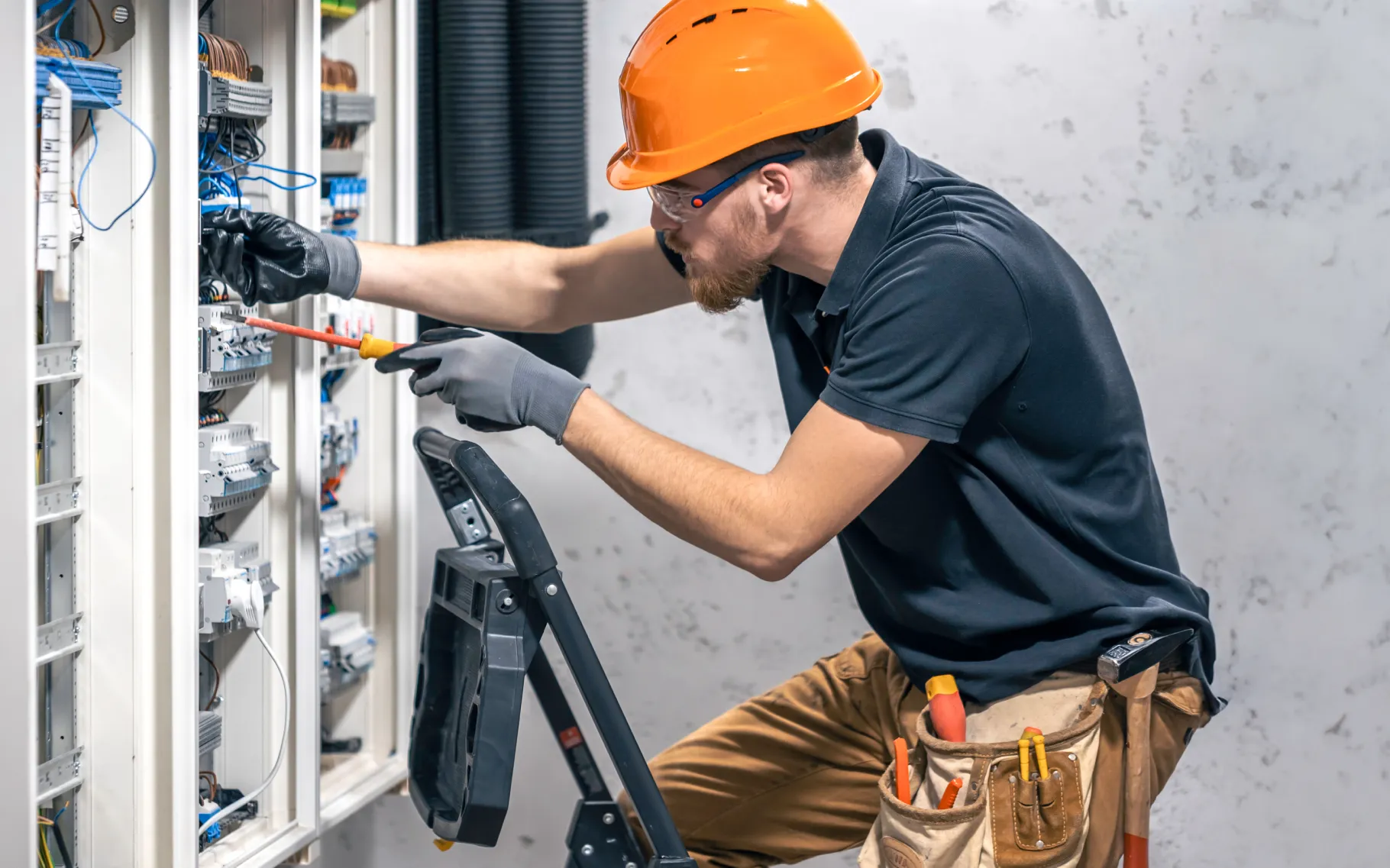Between paperwork pile-ups and seemingly endless review timelines, pulling trade permits can feel like the slow-motion section of every project. For electricians and contractors, each permit application is another set of forms, plan sets, and back-and-forth emails that steal billable hours and push finish dates.
This guide is your shortcut to electrical permits. We break down when and why you need one, what the submission process looks like, and how much you can expect to pay — plus pro tips for keeping the AHJ’s (authority having jurisdiction) review clock from stalling your crew.
Pull electrical permits faster with PermitFlow. Learn how.
When do you need an electrical permit?
Electrical permits are legal requirements designed to ensure that any new installation, upgrade, or repair meets national safety standards — primarily the National Electrical Code (NEC) — and complies with local building codes.
Here’s a breakdown of common residential electrical projects that require a permit:
- Panel changes or upgrades: If you’re swapping out an older 100-amp panel for a new 200-amp panel, permits are required.
- Rewiring or adding circuits: Whether it’s a full house rewire or just adding new outlets, this work is enough to trigger a requirement for an electrical permit.
- Appliance installations: Installing high-energy demand appliances such as electric ranges, dryers, or HVAC systems requires a permit.
- Outdoor and landscape lighting: Running underground cables or adding outdoor lighting to a deck or yard often requires a permit, as weather can create dangerous issues if electrical systems are installed incorrectly.
- Installing electric vehicle (EV) chargers: Similar to high-energy demand appliances, EV chargers require a lot of energy and will require a permit to connect to the grid.

Electrical permit requirements by state
Electrical permit rules aren’t the same everywhere. Each state — and often each city within it — sets its own codes, application process, and inspection requirements.
In some places, homeowners can pull their own permits for small jobs, while in others, only a licensed electrician can.
Here are a few examples of how electrical permit requirements differ across the U.S.:
- California
Most electrical work requires a permit, including panel upgrades, new wiring, and EV charger installations. Homeowners can apply, but inspections by the local building department are mandatory before final approval. - Texas
Larger cities like Austin or Houston require permits for almost all electrical projects. Smaller jurisdictions may exempt minor work, but state law generally requires that only licensed electricians pull permits. - Florida
The Florida Building Code enforces strict rules. Permits are required for service upgrades, rewiring, and additions. Some counties allow homeowner permits for single-family residences, but many require contractor licensing. - New York
In New York City, the Department of Buildings regulates permits, and only licensed master electricians may file. Outside NYC, requirements vary by county or municipality. - Illinois
Chicago has its own electrical code and permit process, which is stricter than most of the state. In suburban areas, some municipalities allow homeowner permits, but inspections are still required.
Because these rules vary so widely, the safest approach is to check with your local authority having jurisdiction (AHJ) before starting work. Even seemingly small jobs, like adding outlets or installing new lighting, may require a permit depending on where you are.
What electrical work can I do without a permit?
Minor repairs, such as a damaged outlet or switch cover, usually don’t require a permit. Always double-check with your local government authority to avoid any issues. What’s considered a minor fix in one municipality may require a permit in another.
Check out our Municipal Guides for details about permitting processes in your location.
How to get an electrical permit
Although every AHJ runs its own show, the permitting process usually follows the same beats. Use the checklist and pro tips below to shave days — or even weeks — off the cycle.
Typical cost of electrical permits
Permit fees vary significantly depending on the scope of work and where you’re located. For most electrical permits, expect to pay anywhere between $50 and $500.
Here are a few variables that affect permit pricing:
- Project type: A simple outlet addition may cost $50, while a full panel upgrade can run $200 or more.
- Project valuation: Some departments base permit fees on total job cost.
- Local fee structure: Big-city building departments often have tiered fee systems, while smaller towns might charge flat rates.
Electrical permit requirements
Getting your electrical permit approved quickly means submitting the right documentation.
Most permitting offices will require:
- Contractor credentials
- Active electrical-contractor license (state or city, whichever has authority)
- General-liability and workers’-comp certificates naming the AHJ as certificate holder
- Detailed scope of work
- Room-by-room description of every circuit, device, or service upgrade you’ll touch
- Exact amperage changes, footage of conduit runs, and any demolition involved
- Electrical plans / one-line diagram
- Conductor sizes, breaker ratings, grounding/bonding paths, and panel locations
- Show existing vs. proposed to make code review faster
- Load calculations
- Mandatory for new feeders, service upgrades, or high-draw additions such as EV chargers, spas, or whole-home generators
- Use demand factors; don’t plug in raw nameplate ratings unless required — it can falsely trigger a larger service upgrade
- Product specification sheets (“cut sheets”)
- UL-listed data sheets for panels, breakers, EVSE, generators, lighting controls, etc.
- Must show model numbers, wattage, short-circuit and fault-current ratings
- Site-specific extras (only if triggered)
- Historic-district or architectural-review approvals
- Flood-zone elevation certificates
- Fire-stopping details for multifamily or mixed-use buildings
- HOA or utility “permission to operate” letters (solar, generator, service upgrade)
It’s important to be thorough and accurate, as this can speed up the approval process and minimize costly reworks.
Pro tip: Using permit management software can help to corral all of your documents in a central location, so you can easily prepare and double-check all of your documents before submission.
The importance of electrical permits for contractors
Some contractors view permitting as an extra hassle that’s not worth the work. However, it’s a fundamental part of the practice.
Correctly pulling permits is smart business for a few reasons:
- Builds client trust: Homeowners feel confident knowing the work is done by the book.
- Avoids legal issues: Unpermitted work can lead to fines, project shutdowns, or insurance claims. Correctly applying for permits helps mitigate this.
- Protects licensure: Repeated permit violations can jeopardize your ability to maintain your license as a contractor.
- Decreases inspection time: Projects that accurately follow the permitting process rarely face delays and breeze through inspections quickly.
- Future-proof client homes: Proper permitting establishes a written record that helps with property resale or insurance issues if needed.
Pull electrical permits faster and easier with PermitFlow
Electrical work is already detail-heavy. Chasing signatures and city log-ins shouldn’t add another circuit of headaches. PermitFlow turns permitting from a time-sink into a background task, so you can stay on job sites and out of the permitting weeds.
Why electricians choose PermitFlow
- File in minutes, not days.
- Smart forms autofill your license, insurance, and load-calc templates for any AHJ in the country.
- Real-time status updates.
- Know exactly when a reviewer opens your plans, requests corrections, or approves your permit.
- Local experts
- Our team of permitting experts understands permitting requirements in whichever jurisdiction you’re working in.
The result: Faster approvals, fewer RFIs, and projects that stay on schedule — without you babysitting the paperwork.
Ready to wire more jobs and wrestle fewer forms? Talk to a PermitFlow permitting expert today.








